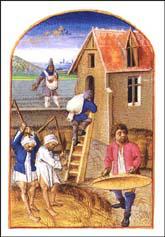Lanfranc
Lanfranc, the son of a lawyer, was born in Pavia in about 1010. At the age of twenty he left Italy and moved to France to complete his studies. He moved to Normandy and in 1039 established a school in Avranches.
In 1042 he became a monk at the Abbey of Bec. An outstanding biblical scholar, Lanfranc became Prior of the Abbey of Bec in 1045. He opened a school in the monastery and was soon attracting scholars from France, Gascony, Brittany, Flanders, Germany and Italy. This included Anselm, the future Archbishop of Canterbury.
Lanfranc established a reputation as one of the world's most important biblical scholars. In 1053 he came into conflict with William the Conqueror over his disapproval of the duke's marriage to Matilda of Flanders. William ordered Lanfranc to leave Normandy but the two men were later reconciled.
In 1063 William the Conqueror appointed Lanfranc as Abbott of St. Stephen's in Caen. Three years later he played an important role in persuading Pope Alexander II to support the Norman invasion of England.
On the death of Maurilius in 1067 Lanfranc was asked to become Archbishop of Rouen. He refused and instead became William's representative in Rome. In 1070 Lanfranc replaced Stigand as Archbishop of Canterbury. Over the next few years he rebuilt Canterbury Cathedral on the model of St. Stephen's in Caen.
Lanfranc was unimpressed with the quality of the English clergy and during William's reign supported his policy of promoting foreigners to high office in the Church. Lanfranc also ordered that in future no married man was to be ordained as a priest. However, he allowed existing priests to keep their wives.
Lanfranc came into conflict with the Odo of Bayeux concerning the ownership of land in Kent. Geoffrey of Coutances ruled in Lanfranc's favour and the lands were returned to the Church.
In 1075 Waltheof confessed to Lanfranc that he was involved in a conspiracy to overthrow William the Conqueror. Lanfranc insisted that Waltheof should tell the king of his actions. Waltheof did so and was executed on 31st May 1076. It is also claimed that Lanfranc was behind William's decision to arrest and imprison Odo of Bayeux in 1082.
Lanfranc crowned William Rufus king on 26th September, 1087. The following year he supported the new king against the attempts by some Normans, includingOdo of Bayeux, Robert of Mortain, Richard Fitz Gilbert, William Fitz Osbern and Geoffrey of Coutances, to place Robert Curthose on the throne.
Lanfranc died in Canterbury on 24th May, 1089.

